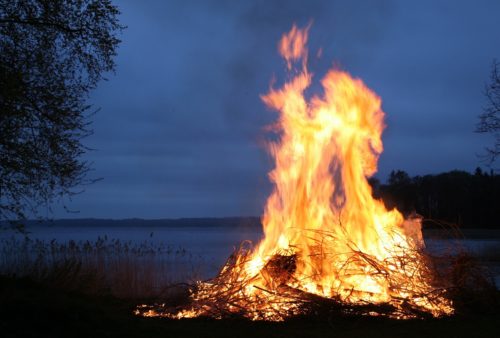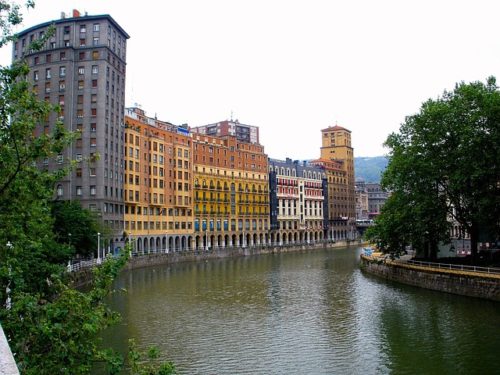Pagan Perspectives
A few years ago, I attended a bonfire celebration in South Florida for Midsummer, complete with drinks and drumming. It took place close to the beach, so there was a constant breeze, and it was held later in the evening, so the thunderstorms had passed over and the mosquitoes were full and satiated. The air was thick and accented by night-blooming flowers. But it was also bearable. The night takes no toll like the day.
That year, a few friends interested in Paganism asked to join. They let the drums lead their bodies and thoughts. They played by the fire and listened to the spontaneous rituals that often take place at these events. One friend, whom I’ve known for years, turned to me, hands waving at all the revelry, and asked, “So what is the meaning of Midsummer? What is the ritual meaning of all of this?” I answered, “The sun begins fading tonight. Midsummer reminds us that we will die.”

[Pixabay.]
Next week, in the northern hemisphere, we materialize death in the first harvest. We begin collecting on the promise of spring, gorging ourselves for the future just like those mosquitoes at dusk. We draw forth the blood of the land, which forms as grains, early fruits, and berries. Each seed is a promise of progeny that we then take and destroy. We sacrifice their future for our present.
We pattern that reflection in ritual and in remembrance. I think of some of my ancestors who lived on the southern edges of the Celtic Sea where it meets the Cantabrian, and I can imagine the same harvest festivals beginning; and I think of other festivals, brought in because of August’s heat and the same reflections of life and death that a festival like Lughnasadh demands of us. It evokes a connected culture that has survived empires and evangelization.
It is that common counting of time that binds us together as a community across the present and into recesses of time. It binds us to societies of the past, where common ancestors marked passages across the quarters and cross-quarters. These rituals honor the same experiences, the same relationships to nature and the same understanding of our place in the world. All of those common bonds built upon an over-confident estimation of cultural ties.
What we share with our ancestors is the human experience. To claim that our culture is identical, however – or even comparable – is likely a romance. Our cultures might be in communion with one another, but they are not the same. Even our ancestors of the more recent past – say 150 years – may be linguistically incomprehensible and culturally distant. Their daily experiences and their economies molded their rituals and their conversations with the spirit. Those experiences and economies can be so afield from our routine lives that they are simply exotic to us.
Those ancestors – in fact, all ancestors – are frankly foreign. We are deeply connected, and yet still unquestionably alien to one another. Time is as powerful a barrier as any ocean, desert, or mountain chain. What crosses time is more often a familiar echo than a clear voice.
Whether it is place, language or interaction, there will be vestiges of similarity but an expanse of differences that will take work to be forded. I would be lost in any of the places that my ancestors thought of as home, from Bilbao to Ilé-Ifẹ̀ to any Taino village. Even life on the same ancestral plot of land has been twisted by time over decades and then centuries. To be descended from, and to be from, are not equivalent.

A canal in Bilbao, Spain [Pixabay].
Rather than seeing that as a challenge, it presents an opportunity. The dialogue with our ancestors is one of familiar spirits in unfamiliar circumstances. Our ancestors are like the seeds mentioned earlier: they sacrificed their future for our present. They were the agents of the change that brought the present into existence. We are their harvest.
We can learn most deeply by presuming nothing. What we see as a smartphone, they may see as magic. What we see as medication, they may see as a blessing. What we speak and how we speak they may experience as unintelligible.
Yet, these are all invitations to broaden ourselves. We are invited to learn their culture – even, if possible, their language – because it opens their world to us and helps us explain our world better, to us and to them. Learning who they were in their world, when they walked like us, is honoring them for who they are, not what we might want them to be in some romantic view of the past.
Their gift was to offer the present to us. Our obligation is to learn how to communicate into our past. We are responsible for learning their language. We are responsible for understanding their symbols. We are responsible for honoring their messages. To reverse that relationship is like trying to reverse time itself; it is as meaningless as “un-harvesting.”
Our rituals can help us build and heal those connections with them. But our intellect and perseverance can help us bridge that gap, and while our ancestors may be equally as loving, mean, or irritating as they were in mortal life, our relationship is eternally filial. That relationship does not depend on our desire to belong; we simply already belong to each other, just like the sowing and the harvest.
* * *
The views and opinions expressed by our diverse panel of columnists and guest writers represent the many diverging perspectives held within the global Pagan, Heathen and polytheist communities, but do not necessarily reflect the views of The Wild Hunt Inc. or its management.
The Wild Hunt is not responsible for links to external content.
To join a conversation on this post:
Visit our The Wild Hunt subreddit! Point your favorite browser to https://www.reddit.com/r/The_Wild_Hunt_News/, then click “JOIN”. Make sure to click the bell, too, to be notified of new articles posted to our subreddit.
